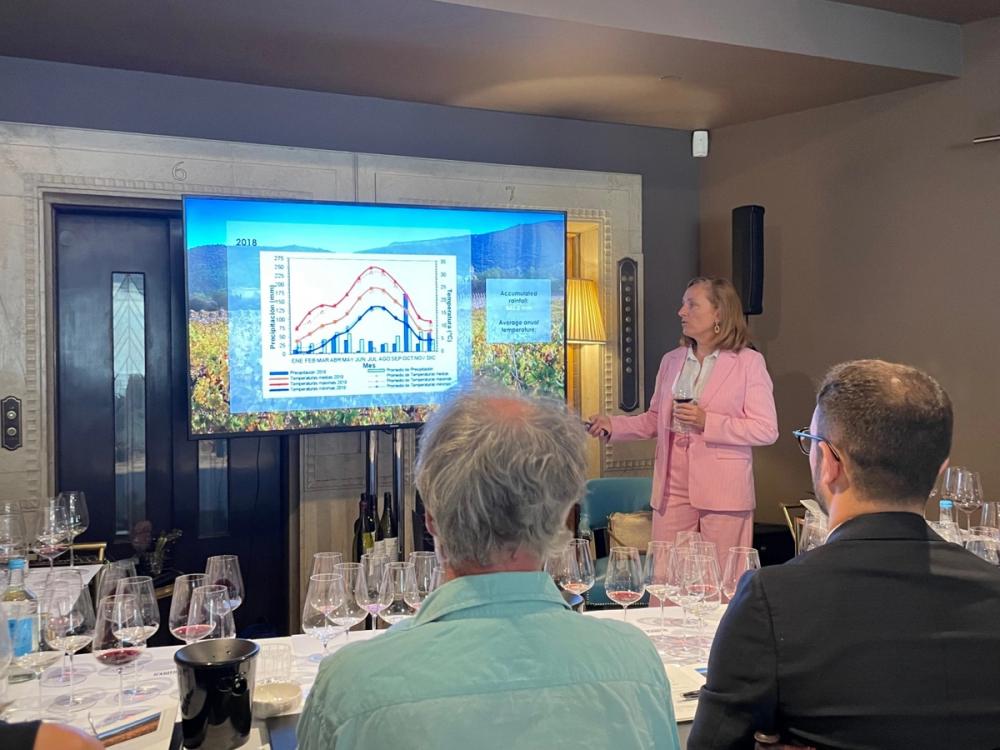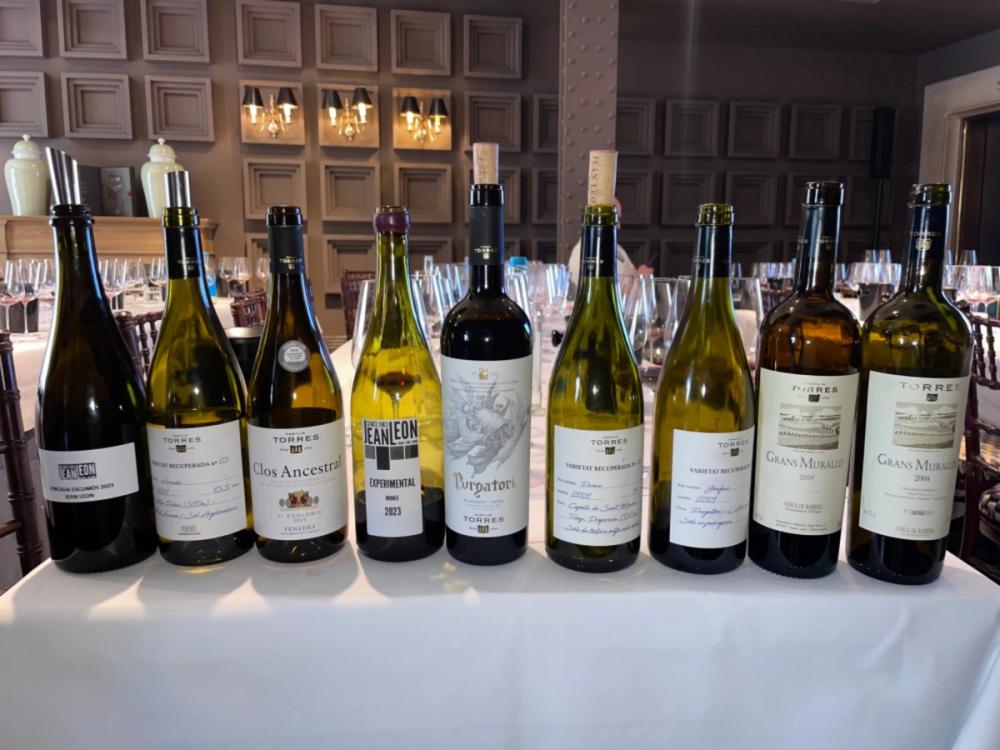I took part in the Familia Torres’ tasting and masterclass on rediscovering ancestral grape varieties run by Mireia Torres, the R&D director at Familia Torres and director at Jean Leon. She is the 5th generation of the Torres family winemakers who have been established since 1870, continuing the tradition of winemaking but embracing innovation in particular regard to climate change.

Mireia Torres presenting latest findings at the Familia Torres masterclass, London, July 3, 2025
Climate change continues to hugely impact the family’s winemaking future. Weather and climate related issues such as wildfires, frost, heatwaves and drought have caused significant issues in the vineyards and, since 2008, adaptation and mitigation actions aimed at reducing CO2 emissions has been a key priority.
In 2008, Torres introduced the Torres & Earth scheme, pledging to reduce 60% emissions per bottle by 2030, 40% of which has been achieved today. Strategies have involved reforestation, reduction in energy consumption and use of clean energy such as with the SOLARWINE project, which integrates solar energy with agriculture and vineyard management. The company is also using methods of carbon capture.
It has also adopted a bottle strategy, with weight reduction and a recycle and reuse scheme. Already 95% of its bottles weigh 420 grams or less, but the company is striving to reduce this further.
Strategies for adaptation are also extensive, including reducing yields, new plantings of rootstocks and careful vineyard planning. Reservoirs collect water for irrigation and ‘SmartCrops’ which uses digital technologies to optimise the efficiency of crop management. Regenerative viticulture is key to prevent desertification, capture carbon and increase biodiversity.
One of the main strategies, however, and the focus of this masterclass was the recovery of ancestral grape varieties. This is important for future sustainability as some may have significant heat and drought resistance, key for the effects of climate change that the world is currently experiencing.
Grape varieties are analysed through DNA testing, cross-referenced with a database and then taken to a plant health treatment centre. In vitro reproduction takes place, and the oenological potential is evaluated. Rootstock is then planted in vineyards and those which are successful are named in relation to their place. Familia Torres has managed to find and revive more than 60 forgotten Catalan varieties in this way, with those chosen to proceed with, based on their pH and alcohol levels.
Tasting the Torres ancenstral varieties

Jean Leon Forcada 2023
This sparkling Forcada is not yet on the market, as it needs a little more ageing. It has notes of green apple, stone fruit and citrus with salinity and a little nuttiness. It is very dry, made in a more savoury style, fresh with high acidity. It has a fine bead with the lees enhancing the mouthfeel.
Forcada 2021, Denominació d’Origen Penedès
I thought this wine was delicious, providing citrus and stone fruit flavours alongside mineral salinity. 10% of the wine has been aged in 2nd use 300L French oak for 6 months, creating the soft mouthfeel which is very well integrated. There is no malolactic but just the lees which adds texture and softens the acidity.
Clos Ancestral Blanco 2023, Denominació d’Origen Penedès
This is a blend of 85% Forcada and 15% Xarel·lo. The spicy fennel notes of the Xarel·lo adds complexity to a floral and fragrant wine. It is soft and mineral and has spent three months on its lees.
Clos Ancestral 2023, Denominació d’Origen Penedès
This wine is 45% Moneu, 35% Tempranillo and 20% Garnacha. As a variety, Moneu is more sensitive to higher temperatures but shows resilience to drought. The wine is light and has lots of red cherry and red plum with some black fruit, enhanced by a small percentage of carbonic maceration. There are toasty notes and some spice, with little tannin due to the short maceration.
Jean Leon MO-23, Denominació d’Origen Penedès
This is 100% Moneu, and this wine is one of only 3007 bottles processed from this vintage due to dry and warm weather resulting in low yields. It has a purple colour, medium body and red and black fruit aromas. Cooler fermentation temperatures of 21°C retains the fresh fruit characteristic. It has some drying tannins and the capacity to age further.
Pirene 2021
This variety is grown at 950m above sea level, in a region which has a high diurnal range. It is a red fruit-forward wine comparable to Pinot Noir. The grapes are small, and skin maceration takes place for five days. It is made from 5% whole grapes and 10% carbonic maceration which helps make this a creates a lovely, elegant wine full of finesse.
Gonfaus 2021
This single varietal Gonfaus has a deep ruby colour with complex aromas of ripe black and blue fruits. It has some spicy undertones and good concentration creating a juicy wine with sweet tannins. There are some slightly oxidative notes too, adding dried fruits to the complexity.
Grans Muralles 2018, Denominació d’Origen Conca de Barberà
Another standout of mine, this wine is a blend of several varieties, 41% Carinena, 39% Garnacha, 10% Querol, 5% Monastrell and 5% Garró. Of the ancestral varieties, the Querol adds red fruit, acidity, colour and soft tannins and the Garró adds freshness and balsamic notes to the blend. The wine has a deep colour and red and black fruits, with vanilla from the 65% new French oak. It has well balanced toasty notes, good acidity and is soft on the palate.
Grans Muralles 2004, Denominació d’Origen Conca de Barberà
This final wine is a slightly different blend of 48% Garnacha, 28% Cariñena, 5% Garró and 5% Samsó. This wine is complex and has pronounced aromas due to the bottle ageing, displaying lots of personality. It has notes of dried fruit on the palate and a brown tint in the glass.
The wines of Familia Torres are imported and sold in the UK by Fells which is a commercial partner of The Buyer. To discover more about them click here.






























